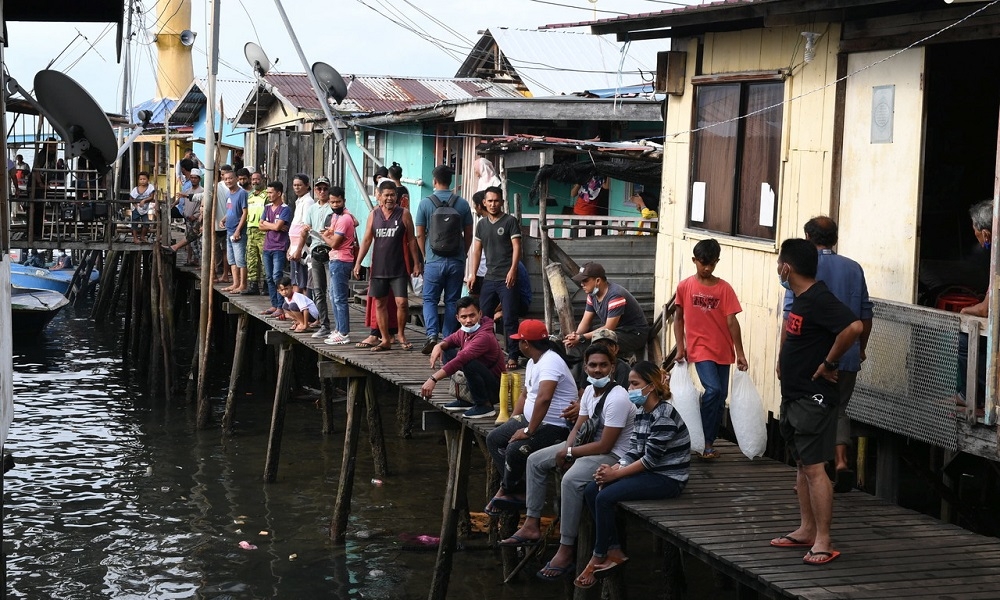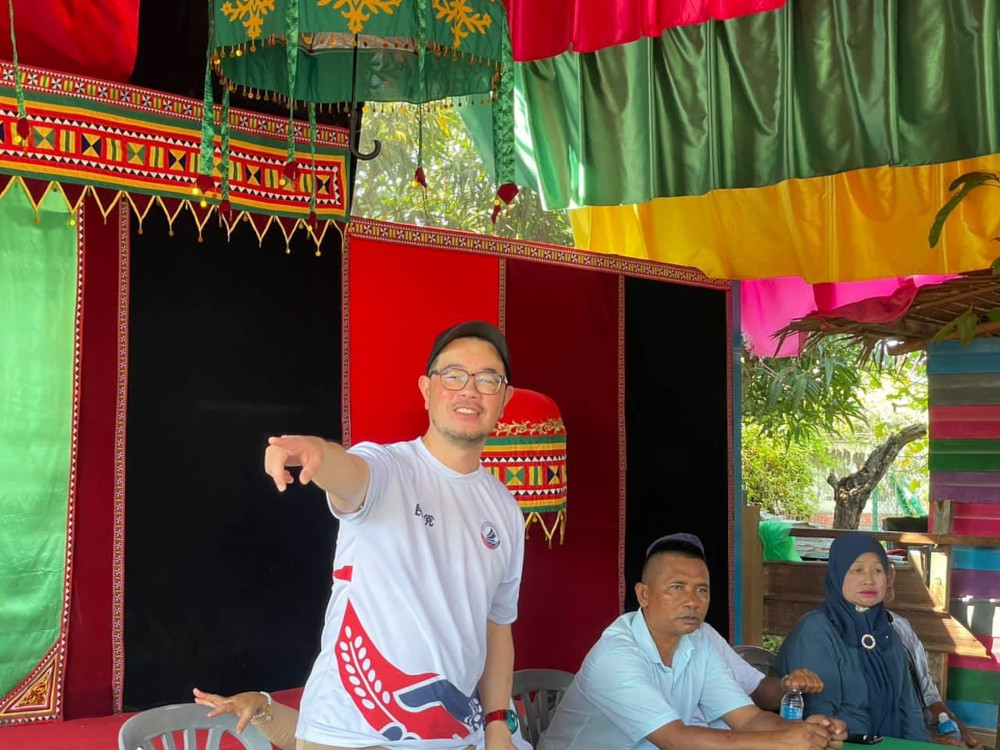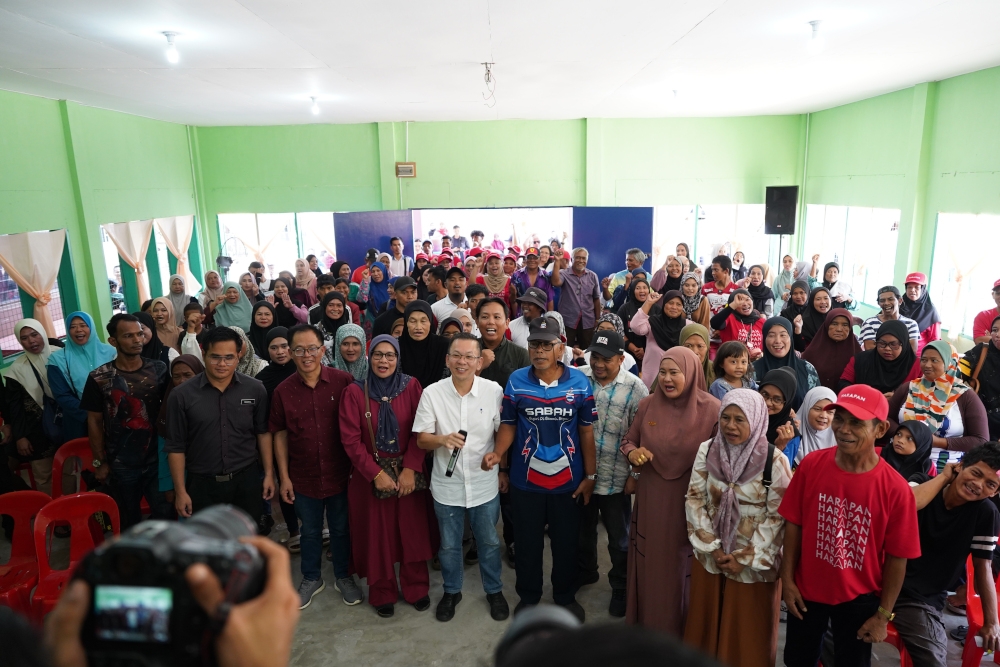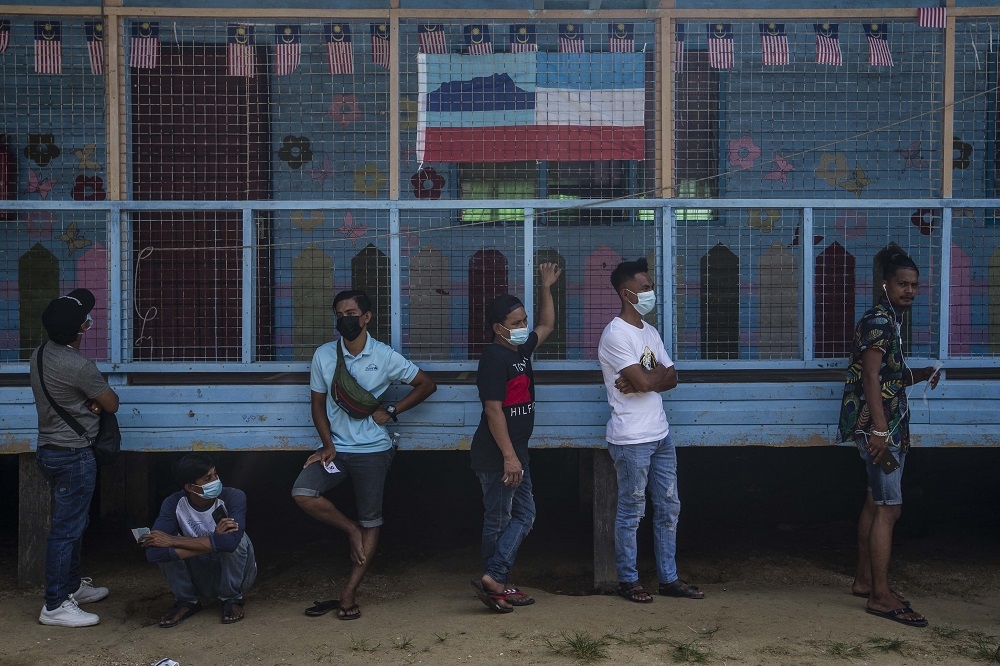
Pulau Gaya emerges as an important battleground for Tanjung Aru in this Sabah state election

File picture of voters arriving at polling station in SK Pulau Gaya by boat, September 26, 2020. — Picture by Firdaus Latif
Friday, 21 Nov 2025 7:00 AM MYT
KOTA KINABALU, Nov 21 — Just 10 minutes by boat across the state capital’s waterfront, Pulau Gaya’s stilt villages are still viewed through the lens of squatter settlements and undocumented migrants, even after decades of integration and development.
Their reputation as a refugee settlement from the 1970s has overshadowed the reality that Gaya island has become home to thousands of Malaysians who are now an integral part of the state capital’s workforce.
Contrasting the tourist bars and shopping malls, the standard of living on the island varies from modest — sturdy stilt homes with electricity and basic sanitation, with designated living spaces, curtains and television — to squalid with cramped huts that have doors that cannot shut and no utilities at all.
Even more jarring, cross the dense tropical hills of the island, sit at least three luxury resorts, bespoke island villas with infinity pools which cost more per night than the average island resident’s monthly salary
The island represents about a quarter of the voters in the Tanjung Aru state constituency, and is an important base for the 21,000 voters in the urban seat.
Out of the seven polling districts in Tanjung Aru, the island has the most, at just over 4,700 voters.
In an island of over 20,000 people, that means many are still undocumented and living on the fringes.
About 63 per cent of the voters are native Sabahans from the West and East coast Bajau Samah, Bajau Laut, Bajau Ubian and Bajau Suluk ethnicities while another 35 per cent are classified as “others”.
Over the decades, there has been some progress for the villages, particularly in Kampung Pulau Gaya where there is a primary and secondary school, and the densely populated Kampung Torong Lodong. Kampung Kesuapan is also among the most structured.
Kampung Pondo and Kampung Lok Urai are “hotspot” areas, with a reputation as a “PTI” (short for Pendatang Tanpa Izin in Malay which means undocumented migrants) den housing Southern Filipinos although this is a gross generalisation.
There have been several incidents in the past involving smuggled firearms and drugs, particularly in Pondo.
Water woes

About 63 per cent of the voters are native Sabahans from the West and East coast Bajau Samah, Bajau Laut, Bajau Ubian and Bajau Suluk ethnicities while another 35 per cent are classified as ‘others’. — Bernama file pic
The complex nature of its demographic and geo-politics makes it hard to have balanced development across the island — wooden paveways, waste management, piped water and electricity are available in select areas — but most residents still live without piped water or electricity.
At a recent event held by the Pakatan Harapan candidate for Tanjung Aru Datuk Chan Foong Hin, the village representative or ketua kampung for the villages griped about water the most.
The villagers are forced to buy water at RM10 per 220-litre barrel, a monthly cost that easily reaches RM300 for small households and can double for larger families.
For 53-year-old housewife Norfatihah Tan, who lives in Kampung Torong Logong with her eight family members depending on a single income, the struggle is constant.
“Water is our biggest problem,” she said. “Every other day the tube wells run out and we need to buy water.”
There was brief hope under the previous Warisan administration when metered pipes were installed in two villages — Kampung Kesuapan and Kampung Pulau Gaya — with 510 homes fitted with such pipes at a cost of RM5.3 million.
“But when the pandemic and lockdown struck, and eventually the next government took over, they never commissioned the water. The infrastructure was just left abandoned and gradually got damaged,” said incumbent Tanjung Aru assemblyman Datuk Junz Wong.
Now to save money, the villagers resort to bathing in the sea and then rinsing off with whatever water supply they have, or collecting rain water.
“We need water to bathe, electricity so our children can study at night, and a surau to go and pray,” said one of the village leaders.

Tanjung Aru incumbent Datuk Junz Wong is fighting to defend his seat for a third term. — Picture courtesy of Junz Wong
The threat of relocation as development pressures grow
The other major concern weighing on islanders is gazettement — or lack of it.
Five villages sit along the eastern belt of the island, but only parts have been earmarked for formalisation.
With renewed tourism development plans nearby, villagers fear displacement.
“We have heard the news about plans for tourism development here. We heard they wanted to relocate us while some said it is not true. Without gazettement, our future is uncertain,” said one villager who wanted to be known just as Mat.
In April last year, Chief Minister Datuk Hajiji Noor told residents of Gaya island that they were to be moved out to accommodate plans to turn the island into a tourist attraction.
He was reported saying that the island had the potential to become a major tourist attraction but the presence of squatters on the island would not bode well with the plan.
“The idea has been there for quite some time and the current state government is planning to shift the people who are locals in Pulau Gaya to the mainland,” he was quoted saying to the villagers.
“Of course many are fearful of this, but when we asked them, they said plans are not confirmed, so we are hoping that it won’t happen,” said Mat, clarifying that “them” refers to various government agencies like those who were running the Madani “adopted village” programme.
“I have grown up on this island. My children were born here. We won’t be happy living anywhere else,” he said.
Battle for the island votes

Kota Kinabalu MP Datuk Chan Foong Hin is banking on the federal unity government to attract voters. — Picture courtesy of Sabah DAP
The Tanjung Aru seat was historically a BN stronghold until 2018, when Warisan, under the helm of Datuk Seri Mohd Shafie Apdal took over, owing perhaps to the deep-rooted ethno-centric voting patterns.
Wong won the seat with a comfortable majority, garnering more than 50 per cent of the votes in both 2018 and 2020, of which many attributed to significant support from the islanders.
Even in a nine-cornered fight, the main battle is between Warisan and the federal unity banner. DAP negotiated its way between BN and GRS to contest the seat and has so far gotten support from BN.
The main question on the ground is whether BN’s voter base will truly transfer its support to PH’s candidate, Chan.
Chan, who is the federal Plantation and Commodities deputy minister, believes BN’s would-be candidate Reduan Aklee’s support during the campaign would make a major difference.
“In Tanjung Aru, all component parties under the Madani government must work together to face the main competition which is Warisan, the incumbent,” he said, adding that PH and BN now operate joint operations (markas) in all five villages on the island.
“Campaigning is the only way to ensure vote transfer. Reduan was with me all day and night yesterday,” he said. “This round is very people-to-people, peer-to-peer campaigning. Very different from conventional DAP campaigns.”
Meanwhile, Wong expressed doubt that the BN voter bases would willingly transfer their votes to the PH candidate, after many years of being on opposite ends of the political divide.

File picture of voters wearing protective masks queuing up to cast their votes during the Sabah state election in SK Pulau Gaya September, 26, 2020. — Picture by Firdaus Latif
“It has been a BN-Warisan turf fight in the last two elections, so it seems far-fetched to me that the voters will believe in the candidate they have seldom seen, from the party they don’t relate to,” said Wong.
“All this while they’ve looked at DAP differently and now they have a new DAP candidate. I doubt they will change their minds so quickly,” he said.
Wong said that he has been working on the ground for two years and the fact that they had laid the groundwork and spent money to install the metered pipes spoke volumes of their sincerity in uplifting the community.
He said that other political parties have not given the same priority to the community.
“These are original communities — not squatters. No government before has treated them as legitimate city dwellers. We don’t want them stereotyped forever. We have spoken with them before about developing places like Sembulan Tengah together, as stakeholders.
“I hope the voters will notice our effort and sincerity all this while,” he said.
***
Pre election would be best time to ask the pollies for what you as a villager need, I remember my late demanding of the MCA candidate "Loh teng" (street lamp) implying the street lamp's damn bulb needed changing - by that evening, there would be a new bulb casting light on the deepening darkness of the night in our kampong, wakakaka. Yes, Mum's need was simple yet ... it required a pre election campaign to wrestle that minor concession out of those political monkeys.
The Socialist Front candidate dared not offer anything because he won't be able to fulfil the simplest request. All he did was to sprout socialist unity etc etc etc, wakakaka.
No comments:
Post a Comment